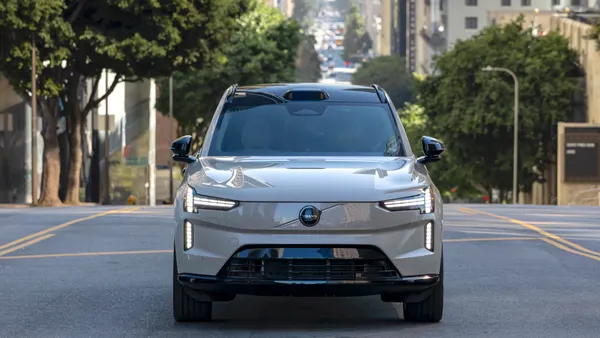Editor's note: This story is part of the WardsAuto digital archive, which may include content that was first published in print, or in different web layouts.
Motorists passing by Muzi Ford in suburban Boston in recent months may have noticed bright new banners proclaiming the formerly best-kept secret in town: Muzi sells Chevrolets, too. If drivers were tempted to do a double take, they weren't alone.
Dale Cammarano Sinesi, part of the trio that runs the third-generation family business, Muzi Motors Inc., says the pairing of the two traditionally competitive brands has set the showroom abuzz, even though the dealership has been quietly selling Chevys for a while.
“People in the Chevy showroom often ask if they should make the check out to Muzi Ford,” she says.
Since Sinesi took over the Chevy side of the dealership in November, a change to high profile has been the order of the day. “The people from here in Needham and nearby Newton still say ‘Really?’ when we tell them we've been selling Chevys all along,” she says.
Her goal is to bring the Chevy half of the Muzi dealership out from under the literal shadow of the better known Ford half of the operation (the buildings are a scant 200 feet apart).
Doing that may rank as a major feat of diplomacy. What Muzi has done flies in the face of a rule of the car business. If there is a trend, it is toward getting dealers to be more focused on a given brand.
Manufacturers have been using incentives and some arm-twisting to get franchisees to drop unaffiliated product lines. Co-locating brands with the arch-competitiveness of Ford and Chevy is almost unheard of.
A Ford spokesman admits the arrangement is highly unusual. He says he had never heard of anything similar.
But for Neal Cammarano, the dealer operator who functions as CEO of both operations, that's a point of pride, a kind of declaration of independence.
“Ford was not happy,” he says, referring to Muzi's original decision to add Chevy to the lineup. “Chevrolet didn't have a presence in this immediate area and they were very interested in signing us up.”
He says Muzi is one of only eight dealerships in the country to sell both brands — and most of those dealerships are in small towns where the only way for a company to survive is by combining multiple brands under one operation.
But while Muzi current change of format may unsettle some, it's not the first time.
Though Muzi has been best known as a Ford dealership since the early 1960s, its roots are more diverse. Immigrant John Muzi founded the business as a Tydol gas station in 1932 and added his first car franchise in 1938, selling Willy's American, Desoto, Chrysler/Plymouth and Diamond T trucks.
Later he added Hudson, Dodge Trucks, GMC Trucks, International Trucks, Alpha Romeo, Fiat, Jaguar and Jeep franchises.
The company was strategically located across from the Howard Johnson's restaurant on old Route 128, a busy two-lane highway that linked Boston's suburbs prior to completion of the modern superhighway.
In 1956, construction of the new Route 128, the nation's first circumferential beltway, required taking of Muzi's land. The business moved to its present location at the Route 128 and I-95 interchange. John's son Frederick Muzi, a 1953 graduate of Babson College, also joined the business that year.
Today, Muzi's operations gross about $100 million annually, says Neal Cammarano, and they include both car dealerships as well as the WashWorld car care center.
He says Muzi has been a top-performing dealership for Ford for more than 40 years. The challenge now, he says, is to do the same with Chevrolet.









